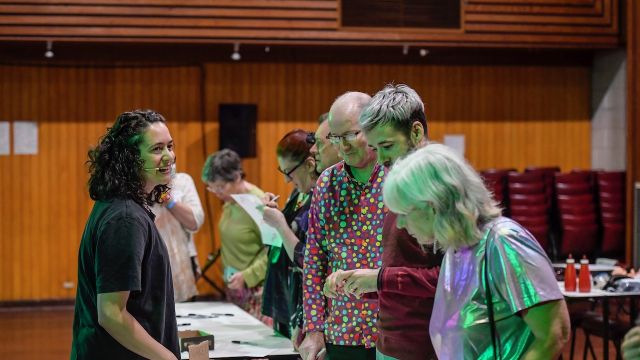Grand Theft Theatre
Not your usual Festival venue - a cherished community hall on the southern fringe of the city. Nor is this the customary measured stroll into a performance where you are ushered to a numbered seat in a softly illuminated auditorium. The audience arrives as the cast wanders about, warms up or says hi. We interact with various performers, take a sticky label to write the name of our favourite theatre work thereon and affix it to our chest, somewhat gingerly wondering if one might be called upon to participate in some way. Next, the chaos of finding a seat in the random jumble of chairs on the auditorium floor means the audience interacts with each other - not always pleasantly as I found out when one person aggressively accused me of stealing ‘his’ chair (I did not).

There is no transition from audience settling formalities into the ‘start’ of the show. No lighting shift as David Williams begins to address the audience with a rehearsed monologue unpacking what we are about to experience. Soon, layered interruptions occur. William Strom invades the space, their movements echoing Hofesh Shechter or Pina Bausch choreographic motifs: abstract, contemporary but somewhat pedestrian, with vocalizations added, including the ubiquitous dancer count-in: “5, 6, 7, 8”. Claire Bird is on the stage with a flip board/sketch pad contraption naming various theatre productions and other members join the ensemble choreography as the flow of the monologue is gradually lost amid interruptions and layered vocals. Audience attention is equally fractured, confused, and entertained.

I was immediately reminded of The Globe in Shakespeare’s time, the bustling energy of audiences and cast all embracing the raucous, communal atmosphere. As the performers took turns launching into telling then recreating memorable, life-changing moments from their personal theatre going lives, other images were evoked of our collective human experience. Rituals of story sharing around a campfire, family or close friendship groups indulging in Charades, Truth or Dare, or perhaps even Spin the Bottle came to mind. The trust and close bonds between this group of performers was palpable which in turn granted the production a sense of danger and immediacy that can excite an audience.

The ‘telling’ from each actor was individual and deeply connected whether the result was humorous or poignant. The re-enacting of said moments was a group effort distinguished by energetic physicality, mad props, and much hilarity. The range of unearthed memories encompassed mainstage Festival works, barely seen Fringe theatre, experimental contemporary works, and productions within Australia and elsewhere.
The current members of Pony Cam are Claire Bird, Ava Campbell, William Strom, Dominic Weintraub and Hugo Williams. David Williams (whose works have won Helpmann, Green Room and Drovers’ Awards) joins them for this iteration and each performer is highly trained, sure of their craft, and immensely watchable. Every actor’s input is utterly masterful though I particularly appreciated Strom’s phenomenal physical abilities as well as Claire Bird’s awe-inspiring headstand, held while continuing a fascinating monologue.

Commissioned by the Melbourne Fringe as part of its 40th birthday year in 2022, and winning Best Theatre that year, Grand Theft Theatre is a bold addition to the Adelaide Festival program. The work flows beautifully and the cast are ‘on’ even through several six minute intermissions where the performance doesn’t truly cease and the room is craftily re-arranged; the audience must re-position themselves and viewpoints are shifted. However, in lesser hands this devised, evolving theatre piece would not have succeeded. There is a fun aura of the ‘workshopping’ phase with notes and props scattered around the space. The energy is intense as the cast work to keep the pace and transitions fresh and rapid. It certainly resonated with parts of the audience on opening night, many also working in the performing arts; at times you kind of had to be ‘in the know’ to grasp some of the allusions.

Theatre and dance are ephemeral art forms. They exist, then they don’t - there is no equivalent of the ‘canvas-on-the-wall’ result. These arts are witnessed and experienced in real time, a series of present moments, then every individual holds a personal memory of what they experienced and no two recollections will ever be the same. In Grand Theft Theatre, an individual is reconstructing a memory in story form to convey the import of a discrete experience. This deed of re-telling begs the question “what is memory and what is memorable”. Another aspect of the event is the history this connected group of people possess where talking about live performance and its impact is inherent. We need more public discourse of this nature in Australia both about what we witness on stage and why it is important.
Lisa Lanzi
Photographer: Roy VanDerVegt
Click here to check out our other Adelaide Festival 2024 reviews.
Subscribe to our E-Newsletter, buy our latest print edition or find a Performing Arts book at Book Nook.

